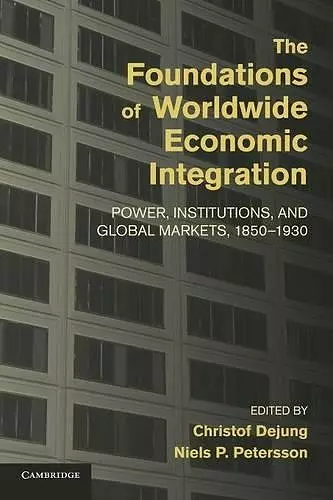The Foundations of Worldwide Economic Integration
Power, Institutions, and Global Markets, 1850–1930
Niels P Petersson editor Christof Dejung editor
Format:Paperback
Publisher:Cambridge University Press
Published:21st Aug '14
Currently unavailable, and unfortunately no date known when it will be back

Discusses worldwide economic integration between 1850 and 1930, challenging the popular description of the period after 1918 as one of deglobalisation.
The essays in this volume discuss worldwide economic integration between 1850 and 1930, challenging the popular description of the period after 1918 as one of deglobalisation. By showing that institutionalism altered its shape in circumstances that challenged international trade, and presenting case studies from various countries, this book offers a fresh perspective on economic globalisation.The essays in this volume discuss worldwide economic integration between 1850 and 1930, challenging the popular description of the period after 1918 as one of mere deglobalisation. The authors argue that markets were not only places of material exchange, but also socially structured entities, shaped by the agency of individual actors and by complex structures of political and economic power. Economic transactions were supported by an array of different institutions, ranging from formalised regulations to informal relations of personal trust. They argue that these networks were strong enough to prosper even during and after World War I, in a political climate often hostile to foreign trade. The Foundations of Worldwide Economic Integration shows that institutionalism altered its shape in the face of circumstances that increasingly challenged international trade. By presenting case studies from various countries, this book offers a fresh perspective on crucial periods of economic globalisation.
'It has become commonplace to argue that institutions and rules matter greatly to economic performance. But how did these institutions and rules emerge and take the particular shapes that they did? Christof Dejung and Niels P. Petersson's significant collection takes a sustained look at global trade in the late nineteenth and early twentieth centuries and shows how European merchants, Indian peasants, imperial statesmen, and others, constructed these institutions and rules. Far from a definite set of tools, the institutions that enabled global trade were the outcome of sustained social contestation on local marketplaces, in national politics, and across ocean-spanning trade networks. Power is back to the debate on institutions - and this book is a must-read for anyone interested in this important story.' Sven Beckert, Harvard University
'When you thought that everything had been said about the 'first' globalization, here is a fascinating book shedding new light on its periodization, especially its persistence in the twenties, the importance of norms and institutions, and the complex relationships between its actors, both public and private, national and transnational, rulers and ruled. A timely reminder of the crucial role of power in the shaping of the global economy.' Youssef Cassis, European University Institute
'This volume provides a challenge to modern historians. It questions the periodization of the 'long tenth century' ending in 1914. It argues that globalization created international institutions, norms, and relations that survived the First World War. By looking at the level of actors, businessmen who shaped international networks, and institutions, the volume challenges wisdom long established by political and economic historians. A must-read for everybody who takes history seriously.' Harm G. Schröter, President, European Business History Association
ISBN: 9781107436978
Dimensions: 229mm x 152mm x 17mm
Weight: 440g
296 pages